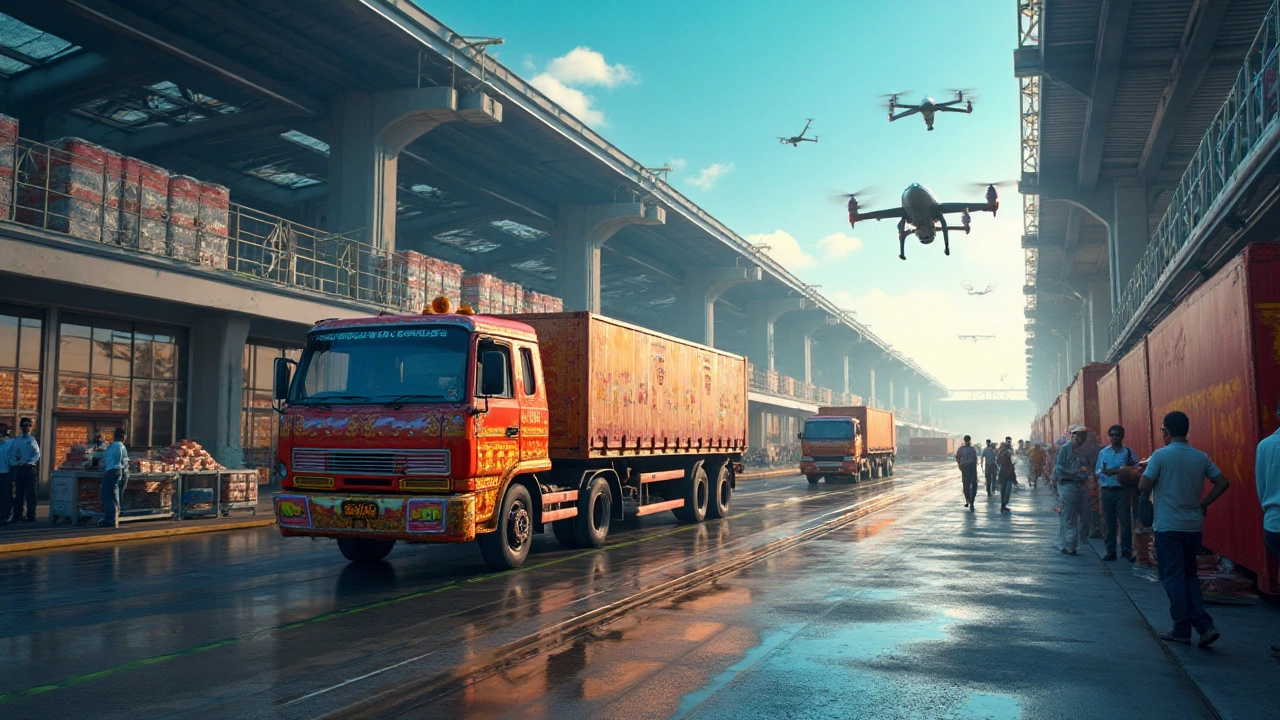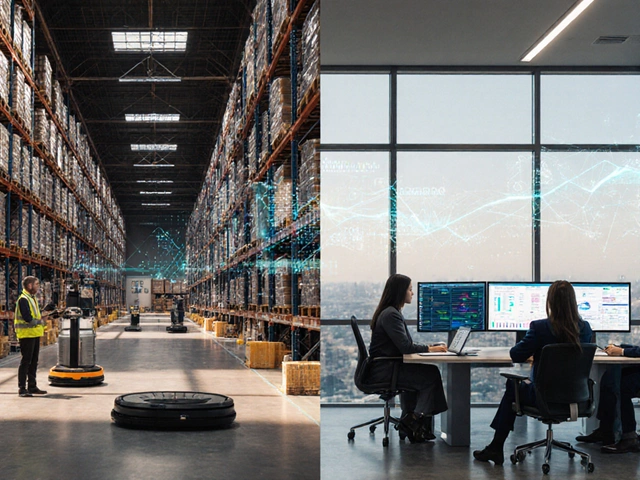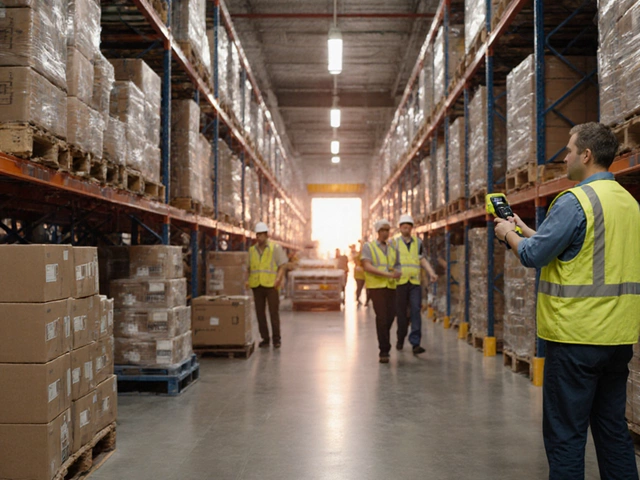The logistics industry is currently witnessing transformative changes, as the intersection of technology, commerce, and globalisation reshapes how goods move from one place to another. As businesses strive to satisfy rapid customer demands and navigate complex supply chains, the question arises: is this industry truly in high demand?
Exploring past challenges and future opportunities paints a vivid picture of a sector on the rise. The fusion of digital tools and innovative strategies gives birth to more efficient and flexible logistics systems that support the ever-increasing expectations of consumers. With advancements like automation, data analytics, and real-time tracking systems, companies can anticipate and respond to disruptions more swiftly, while also cutting down on costs.
- Understanding the logistics landscape
- Technological influences on logistics
- Impact of e-commerce and consumer expectations
- Globalization and supply chain complexity
- Challenges facing the logistics industry
- Future outlook and opportunities
Understanding the Logistics Landscape
The logistics landscape is a dynamic and multifaceted ecosystem that acts as the backbone for many sectors, from retail to manufacturing, and everything in-between. This network involves the intricate coordination of people, technology, and resources, ensuring that goods flow efficiently from producers to consumers. At the heart of this system sits the supply chain, a complex web that must adapt to the often unpredictable shifts in demand, consumer behavior, and external economic factors. One of the notable features of this evolving landscape is the integration of digital technologies, which has transformed traditional logistics into a more agile and responsive service catering to the needs of modern commerce.
Technological revolutions, like the use of AI and machine learning within logistics, have not only streamlined operations but also enhanced predictive capabilities. These advancements allow companies to foresee potential disruptions and optimize routes, saving both time and resources. For instance, companies like DHL and FedEx are utilizing these tools to improve their service offerings, leading to quicker delivery times and heightened customer satisfaction. As noted by the World Economic Forum, "Technological change always supports efficiency, and logistics is no different in benefiting from digital improvements." The complexity inherent in today's supply chain prompts a continuous re-evaluation of strategies to keep pace with these changes.
Globalization has also left a significant mark on logistics, with businesses exploring international markets more than ever before. This interconnectedness amplifies the demand for sophisticated logistics solutions capable of handling cross-border shipments with ease. Companies are now facing challenges like diverse regulatory frameworks and cultural differences that necessitate a level of expertise previously unseen. An increased emphasis on sustainable practices is another consideration driving change within the industry. By adopting green initiatives, logistics companies not only reduce their carbon footprint but also meet growing consumer expectations for environmentally responsible business operations.
Port operators, freight companies, and third-party logistics providers are in constant collaboration, ensuring that each link in the supply chain functions smoothly. As service expectations escalate, the industry has embraced innovation to stay competitive. The burgeoning demand for real-time tracking and visibility encourages logistics firms to implement state-of-the-art tracking systems that assure clients of their shipment's whereabouts at any given moment. This transparency is now a key differentiator for businesses seeking to build trust and loyalty among their customer base.
Emerging trends, such as omni-channel retailing and personalized delivery options, further underscore the need for a nimble and adaptive logistics network. Serving these market demands requires logistics companies to not only invest in cutting-edge technology but also foster a skilled workforce adept at operating within this high-paced environment. As the industry expands, so too does the demand for talent equipped with the expertise and foresight required to drive innovation. The logistics landscape continues to shift, presenting both challenges and opportunities for those willing to adapt and embrace change.
Technological Influences on Logistics
In today's rapidly evolving logistics demand landscape, technology serves as an indispensable driver, shaping how the industry operates and thrives. Technological advancements have primarily focused on enhancing efficiency, reducing errors, and increasing transparency across the supply chain. One of the most transformative developments has been the implementation of automation in warehouses and transportation, which allows for quicker and more precise handling of goods. Warehouse robots, for example, are now capable of managing inventory, picking, and packing with a speed and accuracy that humans alone could not achieve. This level of efficiency not only saves time but also significantly reduces costs, which is critical for logistics companies striving to remain competitive in a fast-paced market.
Another major technological influence on logistics is the use of data analytics. Companies are using advanced data tools to glean insights from enormous amounts of information, leading to more informed decision-making. Predictive analytics, for instance, have become crucial for anticipating demand surges and planning inventory levels accordingly, thus preventing supply chain disruptions. With the rise of IoT (Internet of Things) devices, logistics businesses now have real-time visibility into their entire operation. This means that managers can track the location of shipments at any given moment, ensuring timely deliveries and providing a layer of transparency that was unheard of even a decade ago. As McKinsey noted in a recent study, "IoT technologies are set to have a profound impact on how logistics operations can be optimized, from tracking goods to managing warehouse energy usage."
The rise of artificial intelligence (AI) and machine learning (ML) technologies is another area where logistics is seeing significant improvements. Through AI, logistics companies can optimize their supply chain operations by automating processes like demand forecasting and route planning. Machine learning algorithms analyze historical data to suggest the most efficient transportation routes, taking into consideration factors like traffic patterns and weather conditions. This not only improves delivery times but also cuts down on fuel consumption and costs. AI-powered chatbots and virtual assistants have further transformed customer service in logistics by providing quick, accurate responses to inquiries without human intervention, ensuring clients receive the information they need without unnecessary delays.
Aside from automation and data analytics, blockchain technology has been making waves in the logistics industry. By providing a secure, decentralized ledger, blockchain ensures that every transaction and operation within the supply chain is recorded and verified. This enhances transparency and trust among all supply chain participants, from manufacturers to end consumers. Blockchain helps in minimizing fraud and errors, ultimately improving the consistency and integrity of logistics operations. As transparency becomes a cornerstone of business strategy, companies that adopt blockchain technology gain a competitive advantage in maintaining straightforward and trustworthy supply chains.
Finally, the rapid development of autonomous vehicles promises to revolutionize the transportation aspect of logistics. While still in the experimental stage for long-haul routes, driverless trucks are being tested for safety and efficiency. Once implemented, these vehicles could operate round the clock without the restrictions of human labor laws, drastically reducing delivery times and operational costs. However, with these advancements come new challenges, such as regulatory hurdles and ethical concerns, which the industry must address as it looks to the future.
The constant evolution of technology ensures that the logistics industry remains dynamic and adaptive. As companies continue to innovate, they will need to balance technological possibilities with practical implementation, ensuring that all stakeholders benefit from these groundbreaking changes. As the industry expands, leveraging technology effectively will be key to meeting the soaring expectations placed on modern logistics services.

Impact of E-commerce and Consumer Expectations
The explosive growth of e-commerce has redefined the landscape for logistics services. This transformation is primarily fueled by skyrocketing consumer expectations for faster and more reliable delivery options. Online shopping platforms thrive on their ability to offer a plethora of choices at the click of a button, pushing logistics companies to constantly adapt and innovate. Logistics demand in this domain is not just about moving packages; it’s about exceeding the expectations of increasingly impatient consumers who expect rapid delivery times, seamless returns, and real-time updates on their orders.
This consumer-driven shift has significant implications for logistics providers, who must now operate with a level of agility that was earlier unimaginable. The rise in two-day or even same-day delivery services, which was once a luxury, is rapidly becoming the norm. Achieving this often means leveraging advanced technologies and strategies. Utilising automation in warehouses, deploying AI-driven route optimization, and employing sophisticated tracking systems are some of the pivotal changes happening within this realm. These technologies are no longer considered optional but crucial to maintaining competitiveness in an industry growth trajectory that shows no signs of slowing.
One fascinating aspect of this evolution is how even the smallest changes in consumer shopping habits ripple through the entire supply chain. As an example, during the last holiday shopping season, online retail sales leaped by an astonishing 15%, according to data from several leading market analysts. Such surges often lead to logistical bottlenecks, prompting logistics companies to develop strategies to handle peak times better. The involvement of data-driven decision-making has never been more significant. Embracing analytics helps businesses predict demand spikes and adjust their operations dynamically, ensuring they keep pace with e-commerce trends and maintain customer satisfaction.
The competitive advantage today rests heavily on a company's ability to provide customizable logistics solutions tailored to diverse customer needs regarding speed, reliability, and transparency. Recently, an executive from a leading logistics firm remarked that, "In this age, companies must not only deliver products but promise an experience, and that hinges on their logistics prowess." Logistics services must align closely with brand value propositions, and any failure to meet delivery promises can impact customer trust and brand loyalty.
In conclusion, the impact of e-commerce on logistics is profound and deeply integrated into consumer expectations. Logistics companies are propelling forward with a fusion of technology and service evolution, continuously innovating to enhance efficiency and customer satisfaction. As consumer demands rise, so does the call for logistics solutions that are not just effective but also innovative and future-ready, keeping pace with this digital-first shopping world.
Globalization and Supply Chain Complexity
In today's interconnected world, globalization acts as a powerful force driving the intricate dance of goods across continents. The rising demand for logistics services closely ties to how the world has shrunk, metaphorically, allowing businesses to source materials from one end of the planet and sell the final product on the other. Such a shift has led to the creation of complex supply chains, where multiple stakeholders are involved across various stages of production and distribution. Understanding the nuances of these global supply chains means delving into a myriad of logistics considerations, including transportation costs, regulatory requirements, and potential risks.
A compelling example is the rapid rise of emerging markets as both consumers and producers in the global supply web. As these economies continue to grow, their participation reshapes established trade patterns and introduces new logistical challenges and opportunities. To effectively navigate the complexities of these global supply chains, companies must not only manage the basic flow of goods but also account for risks such as political instability, natural disasters, or sudden shifts in consumer preferences in different regions. This level of unpredictability requires logistics managers to employ more resilient and adaptable strategies, often harnessing advanced technologies to predict and mitigate potential disruptions.
Technological advancements have played a crucial role in simplifying some aspects of global logistics while simultaneously highlighting the complexity inherent in such interconnected systems. Innovations such as blockchain, IoT, and AI-driven analytics offer unprecedented levels of visibility and control over supply chains, enabling real-time tracking and data-driven decision-making. Yet, reliance on digital solutions also comes with its own set of challenges, such as cybersecurity threats or technological obsolescence. A survey by McKinsey & Company noted that supply chain leaders who embraced digital tools reported a significant increase in efficiency and a reduction in costs across their logistics operations, underscoring the vital role technology plays in this sector.
"The more complex supply chains become, the more fundamental logistics will be to achieving competitive advantage," said an expert from the World Economic Forum.
As globalization continues to evolve, businesses must recognize the pivotal role that logistics plays in their success. It is not merely about transporting goods but about ensuring seamless coordination among diverse players in this complex game. By investing in talent, technology, and strategic partnerships, companies can transform supply chain challenges into opportunities for growth and innovation. As a result, the demand for efficient and skilled logistics demand solutions continues to rise, making it a critical area of focus for companies aiming to remain competitive on a global scale.

Challenges Facing the Logistics Industry
The logistics industry is navigating through a labyrinth of challenges as it strives to meet the constantly evolving demands of a fast-paced world. One of the most significant hurdles is the complexity of modern supply chains. As products are sourced from multiple countries, managing the intricate web of suppliers, carriers, and regulations becomes increasingly difficult. This international scope requires logistics companies to possess a thorough understanding of global trade agreements, tariffs, and customs procedures, adding layers of complexity to their operations.
Another major challenge is the ongoing labor shortage within the industry. With the rise of e-commerce and the growing need for rapid delivery services, there's an ever-increasing demand for skilled workers, from drivers to logistics planners. However, attracting and retaining such talent is no easy feat, especially with trends like automation changing job dynamics. Companies are investing heavily in training to upskill their workforce and adapt to the new technological landscape.
Technology, while a boon in many respects, also presents its own set of challenges. Integrating new systems into existing operations requires not only significant financial investment but also a cultural shift within organizations. There is often resistance to change, as employees need to adapt to new workflows and software. Nevertheless, the adoption of innovations such as blockchain for supply chain transparency and artificial intelligence for predictive analysis is becoming indispensable. According to a 2023 survey by Logistics Management, 67% of logistics firms cited technology integration as a top priority but acknowledged the difficulties in implementation.
"The logistics industry stands at the crossroads of tremendous opportunity and significant challenge," says Sarah O'Connor, editor at Global Logistics Magazine. "Navigating this path requires both strategic vision and ground-level execution."
Environmental sustainability also plays a crucial role in shaping the future of logistics. With increasing pressure from both regulators and consumers to reduce carbon footprints, companies are making strides towards greener practices. This evolution entails investing in energy-efficient vehicles, optimizing delivery routes to cut down on mileage, and sourcing eco-friendly packaging materials. However, these initiatives often involve substantial initial costs and can stretch already tight margins. The balance between maintaining profitability and embracing sustainable practices remains a delicate one.
Data security is another pressing issue. As companies increasingly rely on digital systems to manage supply chain operations, protecting sensitive information against cyber threats becomes critical. Ransomware attacks or data breaches can have disastrous consequences, not just financially but also in terms of brand reputation. Logistics firms are thus compelled to invest in robust cybersecurity measures to protect their operations and client data.
The combination of these challenges underscores the critical need for agility and resilience within the logistics sector. As businesses grapple with these issues, the demand for logistics services will depend not only on their ability to adapt and innovate but also on how effectively they can manage and overcome such obstacles.
Future Outlook and Opportunities
The future of the logistics industry promises a wealth of opportunities, fueled by the rapid pace of technological advancements and an increasingly interconnected global market. As the demand for logistics services continues to soar, the need for innovative solutions becomes paramount. It’s not merely about moving goods from point A to point B anymore; it’s about doing so with efficiency, transparency, and sustainability in mind.
The integration of artificial intelligence and machine learning in supply chains is revolutionizing how logistics companies anticipate market fluctuations and streamline operations. With predictive analytics, businesses can forecast demands more accurately and optimize inventory levels, reducing costs and enhancing customer satisfaction. This shift towards a data-driven approach is not just transformative; it's a necessary evolution for companies to stay competitive. A study by McKinsey highlights that logistics providers leveraging AI could see a 15 percent increase in supply chain efficiency over the next decade.
"The freight transport and logistics industry's ability to adapt to technological changes will set winners apart from laggards in the coming years," says Peter Albano, industry expert at the World Economic Forum.As consumer expectations grow, logistics companies must prioritize faster delivery times and greater flexibility. The rise of e-commerce giants has taught us that convenience is king. In response, there's an increasing interest in last-mile delivery solutions. Whether by drone, autonomous vehicle, or bike courier, this final leg of delivery presents an exciting frontier filled with possibility and innovation.
Globalization, despite its challenges, offers extraordinary growth potential for the logistics sector. Emerging markets are set to lead the charge, with Asia-Pacific regions anticipated to dominate by 2030 due to their vast infrastructure investments. An eye is also set on enhancing cross-border trade, as businesses leverage Free Trade Agreements (FTAs) to reduce tariffs and expedite shipments. Such measures demand a robust and dynamic supply chain, making this an exciting arena for logistics players to expand their influence.
Now, speaking of sustainability, companies are increasingly aware of their environmental footprints. Efforts to integrate green practices, such as electric vehicles and carbon-neutral warehouses, are gaining traction. These sustainable initiatives are not just ethically favorable; they appeal to the environmentally-conscious consumer of today. As logistics businesses move toward these greener solutions, they reflect a broader commitment to fostering a more sustainable industry—a challenge, yet a tremendous opportunity for future growth.
With a forward-thinking approach and a willingness to embrace change, the thriving landscape of logistics offers a spectrum of opportunities. The future will likely witness companies leveraging cutting-edge technology, enhancing customer experience and embracing sustainability as they chart a course through the evolving demands of the 21st century. In a world where 'time is money' resonates more than ever, logistics providers that can deliver speed, reliability, and innovation are poised to lead the charge in this fast-paced industry.





